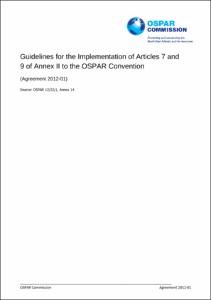| dc.date.accessioned | 2018-10-19T17:37:41Z | |
| dc.date.available | 2018-10-19T17:37:41Z | |
| dc.date.issued | 2012 | |
| dc.identifier.citation | OSPAR Commssion (2012) Guidelines for the Implementation of Articles 7 and 9 of Annex II to the OSPAR Convention. (Agreement 2012-01). London, UK, OSPAR Commission, 11pp. DOI: http://dx.doi.org/10.25607/OBP-114 | |
| dc.identifier.uri | http://hdl.handle.net/11329/536 | |
| dc.identifier.uri | http://dx.doi.org/10.25607/OBP-114 | |
| dc.description.abstract | Procedures and criteria for determining and addressing Force Majeure situations as referred to in Article 7 of Annex II of OSPAR Convention / Procedures and criteria for determining and addressing emergency situations as referred to in Article 9 of Annex II OSPAR Convention. --- Under Article 7 of Annex II of the OSPAR Convention, Annex II does not apply in case of force majeure, due to stress of weather or any other cause, when the safety of human life or of a vessel or aircraft is threatened. Such dumping is to be conducted so as to minimise the likelihood of damage to human or marine life and must be reported immediately to the OSPAR Commission, together with full details of the circumstances and of the nature and quantities of the wastes or other matter dumped. Where the article applies, it permits the dumping, without a permit, of wastes and other matter which would otherwise be prohibited under Article 3. Article 7 focuses on extremely urgent situations involving vessels or aircraft in, on or over the ocean that have to dump wastes or other matter immediately or almost immediately in order to safeguard human life or the safety of a vessel or aircraft.
PROCEDURES AND CRITERIA FOR DETERMINING AND ADDRESSING EMERGENCY SITUATIONS AS REFERRED TO IN ARTICLE 9 OF ANNEX II OF THE OSPAR CONVENTION. Under Article 9 of Annex II of the OSPAR Convention, a Contracting Party may allow the destruction or disposal of wastes or other matter at sea which would otherwise be prohibited under the Annex in emergency situations when the wastes or other matter concerned cannot be disposed of on land without unacceptable danger or damage. However, unlike Article 7, note that Article 9 does not disapply the permit requirements of Article 4. Article 9 does not only cover wastes or other matter arising within the marine environment, but is also relevant to wastes arising on land. When relying on Article 9, Contracting Parties must first consult each other with a view to finding the most satisfactory methods of storage or the most satisfactory means of destruction or disposal in the circumstances. The OSPAR Commission is to be informed of the steps adopted following this consultation. Under the Article, Contracting Parties have pledged to help one another in Article 9 situations. | en_US |
| dc.language.iso | en | en_US |
| dc.publisher | OSPAR Commission | en_US |
| dc.subject.other | Waste disposal | en_US |
| dc.subject.other | Dumping | en_US |
| dc.subject.other | Pollution | en_US |
| dc.title | Guidelines for the Implementation of Articles 7 and 9 of Annex II to the OSPAR Convention. (Agreement 2012-01). | en_US |
| dc.type | Report | en_US |
| dcterms.type | Report | |
| dc.description.status | Published | en_US |
| dc.format.pages | 11pp. | en_US |
| dc.contributor.corpauthor | OSPAR Commission | en_US |
| dc.description.refereed | Refereed | en_US |
| dc.publisher.place | London, UK | en_US |
| dc.subject.parameterDiscipline | Parameter Discipline::Environment | en_US |
| dc.description.currentstatus | Current | en_US |
| dc.description.bptype | Guide | en_US |
| obps.resourceurl.publisher | https://www.ospar.org/ | en_US |
 Repository of community practices in Ocean Research, Applications and Data/Information Management
Repository of community practices in Ocean Research, Applications and Data/Information Management
